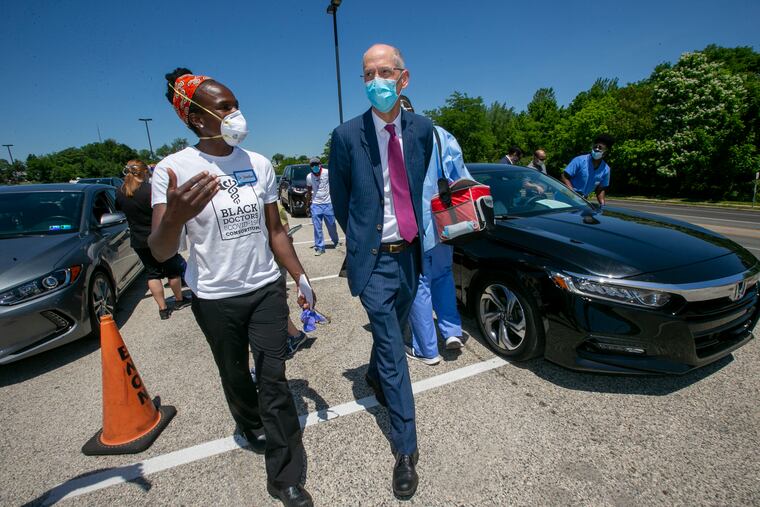Black Doctors COVID-19 Consortium wins city funding for testing after a reversal
Mayor Kenney and Health Commissioner Thomas Farley embrace new partnership with black doctors who have used their own money and time to provide free coronavirus testing to more than 5,000 residents.

Just two weeks ago, City Council members excoriated Mayor Jim Kenney’s administration and the health commissioner for what they viewed as a failure to support the Black Doctors COVID-19 Consortium.
On Tuesday, Kenney and Health Commissioner Thomas Farley pledged to fund the consortium’s efforts to provide free testing to residents in neighborhoods hit hardest by the pandemic.
“It’s especially important for us to make testing incredibly easy for African American populations,” Farley said. “So the Black Doctors Consortium has shown that they know how to do that. They take testing to where the people are."
Consortium volunteers erupted in cheers and applause as Farley spoke during a news conference at a pop-up testing site in the parking lot of Enon Tabernacle Baptist Church in Germantown, where hundreds lined up in cars to get swabbed for the coronavirus.
Kenney said the city’s contract with the consortium hasn’t been finalized, but when pressed by reporters, he suggested the contract is worth roughly $1 million over six months.
During a May 27 budget hearing, Farley said he was not inclined to partner with the consortium because the city already had contracts with two other health-care providers. He was satisfied with the rate of testing of black Philadelphians, Farley told Council.
“We think [the consortium’s work] is great,” Farley said during the hearing. But, he added, “it wasn’t like they were the only organization that was offering testing to African Americans.”
Farley’s comments drew sharp criticism from Council members, including Cherelle L. Parker, usually a Kenney administration ally.
On Tuesday, Parker, who attended the news conference, thanked Kenney and Farley for “acknowledging in a very substantive way that not only do black lives matter to you," but ensuring that people get tested.
"There’s never a wrong time to do the right thing,” she said.
Parker hailed consortium leader Ala Stanford, a pediatric surgeon who grew up in North Philadelphia, as “the Harriet Tubman of coronavirus,” a reference to the abolitionist who rescued enslaved people.
To date, Stanford and her Black Doctors COVID-19 Consortium have tested more than 5,000 residents at 22 testing events in partnership with black churches. Roughly 96% of those tested are black, Stanford said.
“This whole enterprise came from a life of being black in America and having to wait, of people telling you, `Be patient, don’t worry, help is coming,’” Stanford said. “I was tired of waiting for someone to save us."
Stanford said it costs roughly $25,000 a day to test between 250 and 300 people. She declined to disclose how much the consortium expects to receive in city funding but called it “a respectable amount.”
Stressing the importance of the consortium’s work, Farley noted that “African Americans have higher rates of infection than other racial groups in Philadelphia,” representing 46% of known coronavirus cases and 51% of deaths.
Farley and other medical experts have pointed to longstanding racial inequities in health care as the primary reason for the disproportionate impact of COVID-19 — and other diseases — on African Americans.
After touring the Germantown testing operation, Farley said he was “incredibly impressed." He said the city plans to continue to partner with the consortium to provide access to a COVID-19 vaccine once it becomes available.
“We need help to get everybody vaccinated,” he said. “That’s going to be huge. So this is a relationship we really want to establish and build on.”